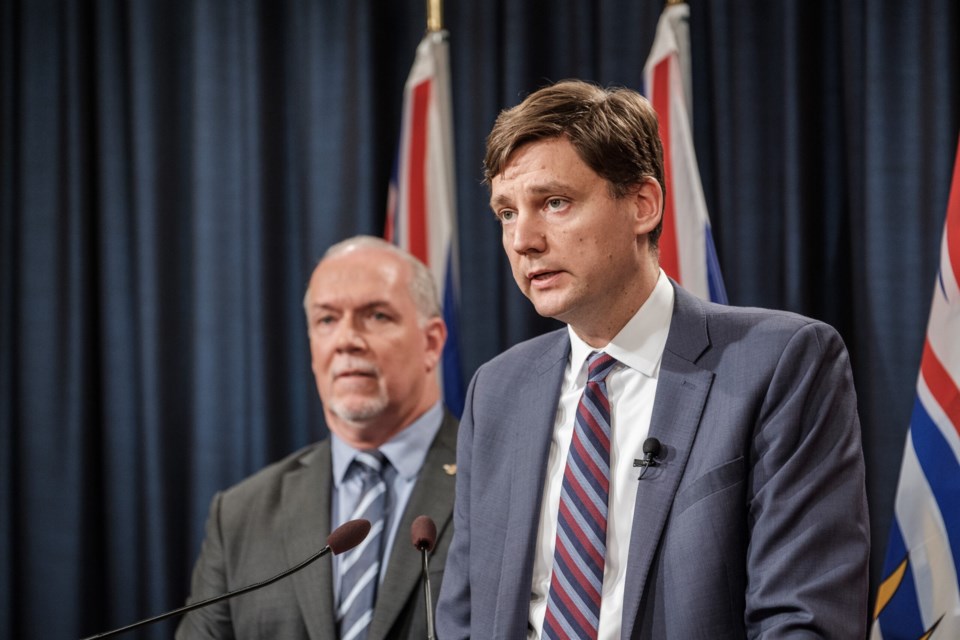Is the BC government going to force municipalities to speed up housing approvals or not?
It’s getting increasingly hard to tell, as Premier John Horgan and Housing Minister David Eby execute a good cop/bad cop routine that is confusing, to say the least.
The latest comments from the premier fell firmly into the good cop category, with a pledge in a CBC interview on Sunday to cooperate with local governments as they boost density to create desperately-needed housing supply.
“We need to make sure that we're building density, and that means collaboration with municipalities, not dictating to municipalities how we do this,” said Horgan.
Sounds clear, except it’s mostly at odds with everything his Housing Minister has been saying for months now, recent legislation introduced this month, and the premier’s own frustrated comments to municipal leaders just a couple of years ago.
“The bottom line is that municipalities are not approving enough housing for our population growth,” Eby told the Canadian Press last month. “I think it’s quite possible that we’re going to need to be more prescriptive. … The status quo is not acceptable.”
Eby has been in bad cop mode for months, repeatedly publicly warning municipalities that their review and approval processes for housing are too slow, tied up in red tape and tilted towards the not-in-my-backyard complaints of powerful local resident groups.
He’s cited a litany of examples, including most recently a proposal by an Oak Bay developer to replace a single family home with a four-storey, 14-unit condo building that took seven years to make its way through council before being rejected over concerns about shadows, a tree, and traffic impacts on local family homes.
All of which has made the minister conclude the province has to add provincial “teeth” to local housing needs studies to force municipalities to approve higher density housing projects – in effect, removing some of their powers to say no.
“I do think we’re going to have to ultimately prescribe some minimum standards for municipalities,” Eby said.
Horgan used to have similar tough talk about the multi-year delays and dysfunctional approvals process that is tying up thousands of housing units in municipal red tape.
In 2019, he blasted municipalities for taking provincial money for transit and then refusing to approve new housing projects – in particular, Vancouver for its foot-dragging on density along the $2.83-billion Broadway Subway line.
“The challenge is some municipal councils want to have it both ways,” Horgan said then. “They want to demand provincial participation, provincial dollars, to meet their objectives, whether it be on transit – SkyTrain or other forms of transit – but not make the same choices about how do we take advantage of those significant transit investments to building housing around that transportation corridor.”
But the Horgan of today has shifted back into the “cooperation” mode of good cop, sparkling his recent speeches with olive branches in the form of “collaboration” with municipal leaders.
To add to the confusion, his government had a different tone when it introduced legislation this month that will allow the province to buy up land around planned transit hubs, like SkyTrain lines and bus terminals.
The bill would essentially allow the province to demand municipalities approve density on the land it has purchased around a proposed transit project, as part of the initial business case for government funding.
Transportation Minister Rob Fleming described it as legislation that will “give municipalities the choice: Do you want public housing and transit? Or do you want to take a pass on that?”
That caught municipal leaders off guard, who’d been told privately that the legislation was simply a minor bit of clarity on land purchasing practices and not a shift of policy at all.
The repeatedly changing tones are making it hard to actually understand what the BC government is thinking when it comes to municipalities and housing.
Some days it looks like this government is gunning to aggressively solve the housing supply crisis by prepping legislation that will strip local councils of certain powers.
Other days, it signals the opposite, wanting to collaborate on gentle cooperative changes.
It could very well be a calculated good cop/bad cop routine by Horgan and Eby, designed to play all sides and obfuscate the province’s true intentions prior to the Oct. 15 municipal elections.
Or, it’s a sign of a growing rift and confusion within the government about how it wants to address a housing affordability issue that’s top-of-mind amongst voters.
Rob Shaw has spent more than 13 years covering BC politics, now reporting for CHEK News and writing for The Orca. He is the co-author of the national best-selling book A Matter of Confidence, and a regular guest on CBC Radio.



